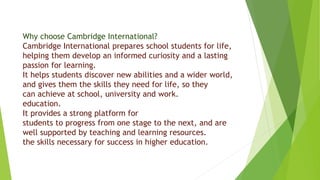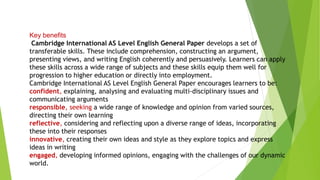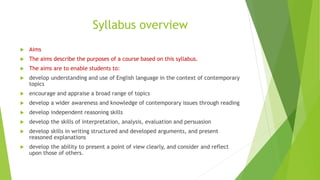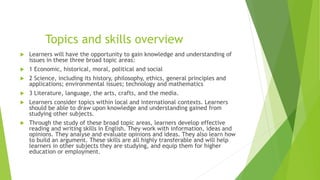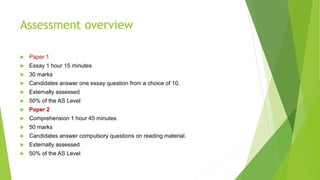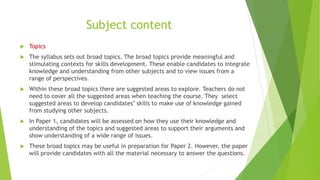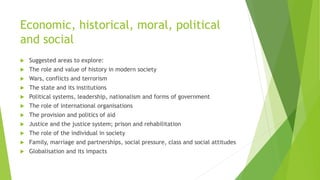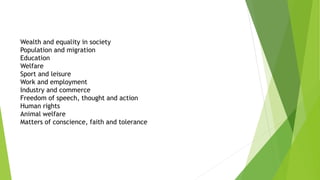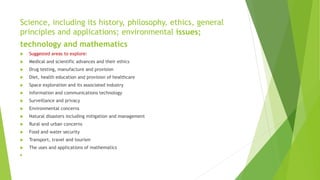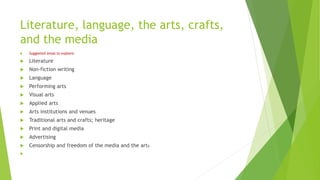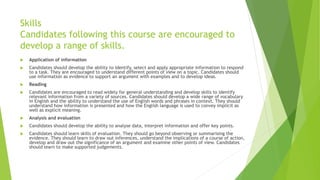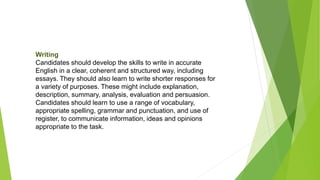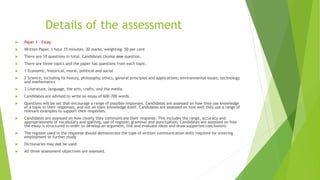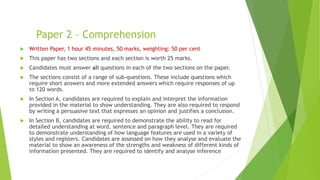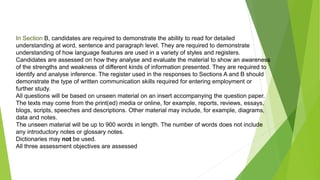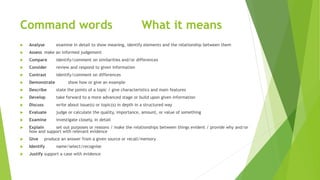Presentation1.pptx
- 1. Cambridge International AS Level English General Paper 8021
- 2. Why choose Cambridge International? Cambridge International prepares school students for life, helping them develop an informed curiosity and a lasting passion for learning. It helps students discover new abilities and a wider world, and gives them the skills they need for life, so they can achieve at school, university and work. education. It provides a strong platform for students to progress from one stage to the next, and are well supported by teaching and learning resources. the skills necessary for success in higher education.
- 3. Key benefits Cambridge International AS Level English General Paper develops a set of transferable skills. These include comprehension, constructing an argument, presenting views, and writing English coherently and persuasively. Learners can apply these skills across a wide range of subjects and these skills equip them well for progression to higher education or directly into employment. Cambridge International AS Level English General Paper encourages learners to be: confident, explaining, analysing and evaluating multi-disciplinary issues and communicating arguments responsible, seeking a wide range of knowledge and opinion from varied sources, directing their own learning reflective, considering and reflecting upon a diverse range of ideas, incorporating these into their responses innovative, creating their own ideas and style as they explore topics and express ideas in writing engaged, developing informed opinions, engaging with the challenges of our dynamic world.
- 4. Syllabus overview ’üĄ Aims ’üĄ The aims describe the purposes of a course based on this syllabus. ’üĄ The aims are to enable students to: ’üĄ develop understanding and use of English language in the context of contemporary topics ’üĄ encourage and appraise a broad range of topics ’üĄ develop a wider awareness and knowledge of contemporary issues through reading ’üĄ develop independent reasoning skills ’üĄ develop the skills of interpretation, analysis, evaluation and persuasion ’üĄ develop skills in writing structured and developed arguments, and present reasoned explanations ’üĄ develop the ability to present a point of view clearly, and consider and reflect upon those of others.
- 5. Topics and skills overview ’üĄ Learners will have the opportunity to gain knowledge and understanding of issues in these three broad topic areas: ’üĄ 1 Economic, historical, moral, political and social ’üĄ 2 Science, including its history, philosophy, ethics, general principles and applications; environmental issues; technology and mathematics ’üĄ 3 Literature, language, the arts, crafts, and the media. ’üĄ Learners consider topics within local and international contexts. Learners should be able to draw upon knowledge and understanding gained from studying other subjects. ’üĄ Through the study of these broad topic areas, learners develop effective reading and writing skills in English. They work with information, ideas and opinions. They analyse and evaluate opinions and ideas. They also learn how to build an argument. These skills are all highly transferable and will help learners in other subjects they are studying, and equip them for higher education or employment.
- 6. Assessment overview ’üĄ Paper 1 ’üĄ Essay 1 hour 15 minutes ’üĄ 30 marks ’üĄ Candidates answer one essay question from a choice of 10. ’üĄ Externally assessed ’üĄ 50% of the AS Level ’üĄ Paper 2 ’üĄ Comprehension 1 hour 45 minutes ’üĄ 50 marks ’üĄ Candidates answer compulsory questions on reading material. ’üĄ Externally assessed ’üĄ 50% of the AS Level
- 7. Subject content ’üĄ Topics ’üĄ The syllabus sets out broad topics. The broad topics provide meaningful and stimulating contexts for skills development. These enable candidates to integrate knowledge and understanding from other subjects and to view issues from a range of perspectives. ’üĄ Within these broad topics there are suggested areas to explore. Teachers do not need to cover all the suggested areas when teaching the course. They select suggested areas to develop candidatesŌĆÖ skills to make use of knowledge gained from studying other subjects. ’üĄ In Paper 1, candidates will be assessed on how they use their knowledge and understanding of the topics and suggested areas to support their arguments and show understanding of a wide range of issues. ’üĄ These broad topics may be useful in preparation for Paper 2. However, the paper will provide candidates with all the material necessary to answer the questions.
- 8. Economic, historical, moral, political and social ’üĄ Suggested areas to explore: ’üĄ The role and value of history in modern society ’üĄ Wars, conflicts and terrorism ’üĄ The state and its institutions ’üĄ Political systems, leadership, nationalism and forms of government ’üĄ The role of international organisations ’üĄ The provision and politics of aid ’üĄ Justice and the justice system; prison and rehabilitation ’üĄ The role of the individual in society ’üĄ Family, marriage and partnerships, social pressure, class and social attitudes ’üĄ Globalisation and its impacts
- 9. Wealth and equality in society Population and migration Education Welfare Sport and leisure Work and employment Industry and commerce Freedom of speech, thought and action Human rights Animal welfare Matters of conscience, faith and tolerance
- 10. Science, including its history, philosophy, ethics, general principles and applications; environmental issues; technology and mathematics ’üĄ Suggested areas to explore: ’üĄ Medical and scientific advances and their ethics ’üĄ Drug testing, manufacture and provision ’üĄ Diet, health education and provision of healthcare ’üĄ Space exploration and its associated industry ’üĄ Information and communications technology ’üĄ Surveillance and privacy ’üĄ Environmental concerns ’üĄ Natural disasters including mitigation and management ’üĄ Rural and urban concerns ’üĄ Food and water security ’üĄ Transport, travel and tourism ’üĄ The uses and applications of mathematics ’üĄ
- 11. Literature, language, the arts, crafts, and the media ’üĄ Suggested areas to explore: ’üĄ Literature ’üĄ Non-fiction writing ’üĄ Language ’üĄ Performing arts ’üĄ Visual arts ’üĄ Applied arts ’üĄ Arts institutions and venues ’üĄ Traditional arts and crafts; heritage ’üĄ Print and digital media ’üĄ Advertising ’üĄ Censorship and freedom of the media and the arts ’üĄ
- 12. Skills Candidates following this course are encouraged to develop a range of skills. ’üĄ Application of information ’üĄ Candidates should develop the ability to identify, select and apply appropriate information to respond to a task. They are encouraged to understand different points of view on a topic. Candidates should use information as evidence to support an argument with examples and to develop ideas. ’üĄ Reading ’üĄ Candidates are encouraged to read widely for general understanding and develop skills to identify relevant information from a variety of sources. Candidates should develop a wide range of vocabulary in English and the ability to understand the use of English words and phrases in context. They should understand how information is presented and how the English language is used to convey implicit as well as explicit meaning. ’üĄ Analysis and evaluation ’üĄ Candidates should develop the ability to analyse data, interpret information and offer key points. ’üĄ Candidates should learn skills of evaluation. They should go beyond observing or summarising the evidence. They should learn to draw out inferences, understand the implications of a course of action, develop and draw out the significance of an argument and examine other points of view. Candidates should learn to make supported judgements.
- 13. Writing Candidates should develop the skills to write in accurate English in a clear, coherent and structured way, including essays. They should also learn to write shorter responses for a variety of purposes. These might include explanation, description, summary, analysis, evaluation and persuasion. Candidates should learn to use a range of vocabulary, appropriate spelling, grammar and punctuation, and use of register, to communicate information, ideas and opinions appropriate to the task.
- 14. Details of the assessment ’üĄ Paper 1 ŌĆō Essay ’üĄ Written Paper, 1 hour 15 minutes, 30 marks, weighting: 50 per cent ’üĄ There are 10 questions in total. Candidates choose one question. ’üĄ There are three topics and the paper has questions from each topic. ’üĄ 1 Economic, historical, moral, political and social ’üĄ 2 Science, including its history, philosophy, ethics, general principles and applications; environmental issues; technology and mathematics ’üĄ 3 Literature, language, the arts, crafts, and the media. ’üĄ Candidates are advised to write an essay of 600ŌĆō700 words. ’üĄ Questions will be set that encourage a range of possible responses. Candidates are assessed on how they use knowledge of a topic in their responses, and not on their knowledge itself. Candidates are assessed on how well they use a range of relevant examples to support their responses. ’üĄ Candidates are assessed on how clearly they communicate their response. This includes the range, accuracy and appropriateness of vocabulary and spelling, use of register, grammar and punctuation. Candidates are assessed on how the essay is structured in order to develop an argument, link and evaluate ideas and draw supported conclusions. ’üĄ The register used in the response should demonstrate the type of written communication skills required for entering employment or further study. ’üĄ Dictionaries may not be used. ’üĄ All three assessment objectives are assessed.
- 15. Paper 2 ŌĆō Comprehension ’üĄ Written Paper, 1 hour 45 minutes, 50 marks, weighting: 50 per cent ’üĄ This paper has two sections and each section is worth 25 marks. ’üĄ Candidates must answer all questions in each of the two sections on the paper. ’üĄ The sections consist of a range of sub-questions. These include questions which require short answers and more extended answers which require responses of up to 120 words. ’üĄ In Section A, candidates are required to explain and interpret the information provided in the material to show understanding. They are also required to respond by writing a persuasive text that expresses an opinion and justifies a conclusion. ’üĄ In Section B, candidates are required to demonstrate the ability to read for detailed understanding at word, sentence and paragraph level. They are required to demonstrate understanding of how language features are used in a variety of styles and registers. Candidates are assessed on how they analyse and evaluate the material to show an awareness of the strengths and weakness of different kinds of information presented. They are required to identify and analyse inference
- 16. In Section B, candidates are required to demonstrate the ability to read for detailed understanding at word, sentence and paragraph level. They are required to demonstrate understanding of how language features are used in a variety of styles and registers. Candidates are assessed on how they analyse and evaluate the material to show an awareness of the strengths and weakness of different kinds of information presented. They are required to identify and analyse inference. The register used in the responses to Sections A and B should demonstrate the type of written communication skills required for entering employment or further study. All questions will be based on unseen material on an insert accompanying the question paper. The texts may come from the print(ed) media or online, for example, reports, reviews, essays, blogs, scripts, speeches and descriptions. Other material may include, for example, diagrams, data and notes. The unseen material will be up to 900 words in length. The number of words does not include any introductory notes or glossary notes. Dictionaries may not be used. All three assessment objectives are assessed
- 17. Command words What it means ’üĄ Analyse examine in detail to show meaning, identify elements and the relationship between them ’üĄ Assess make an informed judgement ’üĄ Compare identify/comment on similarities and/or differences ’üĄ Consider review and respond to given information ’üĄ Contrast identify/comment on differences ’üĄ Demonstrate show how or give an example ’üĄ Describe state the points of a topic / give characteristics and main features ’üĄ Develop take forward to a more advanced stage or build upon given information ’üĄ Discuss write about issue(s) or topic(s) in depth in a structured way ’üĄ Evaluate judge or calculate the quality, importance, amount, or value of something ’üĄ Examine investigate closely, in detail ’üĄ Explain set out purposes or reasons / make the relationships between things evident / provide why and/or how and support with relevant evidence ’üĄ Give produce an answer from a given source or recall/memory ’üĄ Identify name/select/recognise ’üĄ Justify support a case with evidence


